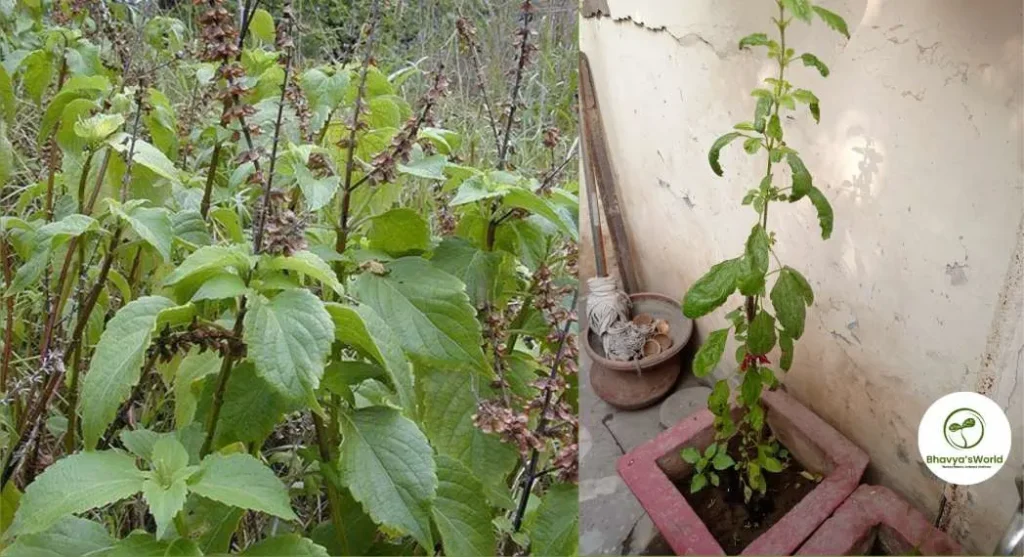People get benefits from tulsi by drinking its water and eating its leaves, which contain immense amounts of nutritional components.
First, let us answer the question i.e. what is Tulsi, also known as Holy basil or Ocimum Tenuiflorum? In addition, people recognize it as a plant that holds sacredness, nutritional value, and medicinal importance.
Furthermore, according to some research, different parts of the plant treat various conditions. For example, from improving digestion and mental health to boosting immunity, many advantages of Tulsi plants distinguish them from other herbs.
Health Benefits of Tulsi
Benefits of Tulsi Drops
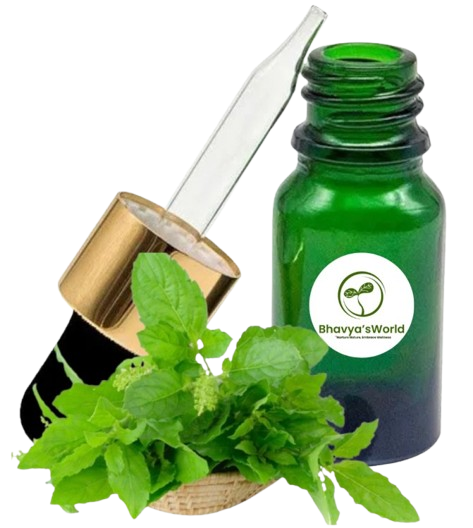
| Minimizes Stress and Anxiety Tulsi in Ayurveda is classified as an adaptogen, which means it contains natural compounds that help the body adapt to stress and anxiety while promoting mental balance. |
| Immunity Booster One of the benefits of Tulsi drops is that, indeed, they contain rich antioxidants and important nutrients; consequently, these components strengthen the immune system and protect against infections. |
| Ease the Respiratory Issues Tulsi drops help against conditions like cold, cough, and asthma due to their anti-inflammatory and anti-microbial properties. Furthermore, they soothe the throat and, as a result, make you feel relaxed. |
| Manages Blood flow The Tulsi plant helps to manage the blood sugar level and reduces the insulin resistance. |
| Detoxification Tulsi drops help to detoxify the human body by throwing out toxins by acting as a natural detoxifier. |
| Digestion Improvement One of the tulsi holy basil benefits is that it helps to reduce acidity in stomachs and improves the gut functions . |
Benefits of Eating Tulsi Leaves

| Improves Skin Health One of the benefits of eating basil leaves daily is that it can purify the blood,reduces the chance of acne and blemishes. |
| Enhances Oral Health Chewing tulsi leaf helps prevent bad breath,plaque and oral ulcer. |
| Aids Weight Loss By taking leaves of tulsi daily, it will help you boost your metabolism and maintain a healthy weight. |
| Relieves Headache When leaves are freshly consumed it is believed that it tends to reduce headaches from its aroma and natural compounds. |
| Acts as an Antibiotic Benefits of Tulsi leaves is that they are antibacterial,antifungal, and help to fight the various infections of your body. |
| Heart Health If we talked about eating tulsi leaves, we should know it helps to regulate blood pressure and lower cholesterol. |
Benefits of Tulsi Water
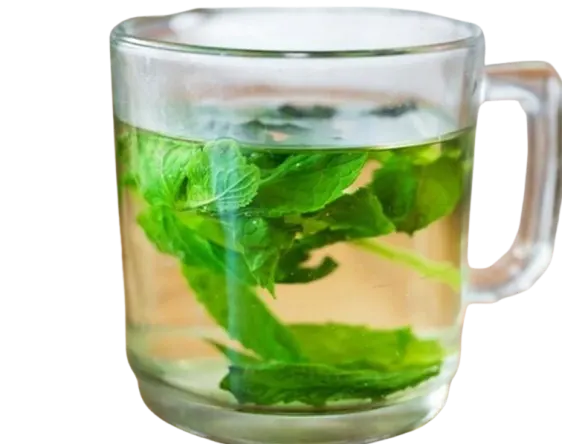
| Aids in Weight Management One of the benefits of drinking tulsi water is it helps to improve metabolism and maintain a healthy weight. |
| Hydrates the Body Holy basil’s benefits are in its water, which hydrates and rejuvenates the body and loads it with nutrients. |
| Respiratory Health Improvement Drinking water boiled with tulsi leaves is very useful in calming the symptoms of sore throat and cold. |
| Enhances Skin Glow Benefits of tulsi include that if a person drinks its water daily it removes toxins from the body and gives natural glow and radiant skin. |
| Prevents Parasitic Stomach Issues Tulsi water inhibits the growth of E.coli infection and is considered best for removal of worms and parasites. It protects your body from these infections. |
Benefits of Tulsi in Women’s Health

| Regulation of Hormones Holy basil benefits have some nutrients and compounds that help regulate hormone levels. |
| Menstrual pain The anti-inflammatory properties of Tulsi reduce menstrual cramps and pain and also helps to improve blood circulation. |
| Fertility Enhancement Holy basil benefits can improve the reproductive health of women and boosts energy. |
Benefits of Tulsi in Mental Health

| Reduces Anxiety and Depression One of tulsi holy basil benefits is that it has adaptogenic properties that helps to calm you down and enhance mental clarity. |
| Enhances Sleep Quality Tulsi has such a compound that acts as a natural relaxant that helps in treating problems like Insomnia that leads to better and improved sleep cycles. |
| Improves Cognitive Functioning Holy basil benefits can improve cognitive functioning which refers to mental ability to think, understand and complete tasks. |
Benefits of Tulsi for Skin and Hair

| Treatment of skin infection Out of so many properties tulsi has antimicrobial properties that help to treat enzymes,psoriasis and many other skin infections. |
| Prevents hair loss and dandruff One of holy basil benefits is that it puts a stop to hair fall and dandruff. It protects the scalp from itching and keeps your scalp healthy. |
| Slows down aging sign Holy basil benefits help you to slow down the sign of ageing like reducing wrinkles,fine lines and dark spots due to its compounds. |
Medicinal Uses of Holy basil
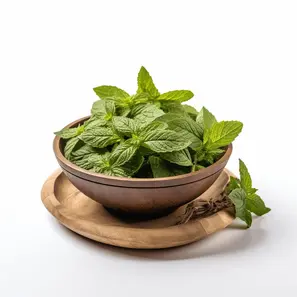
One of the benefits of tulsi is its medicinal uses, which contain chemicals found in plants and certain foods. Furthermore, these have a good effect on humans by promoting good health and preventing cancer as well as heart disease.
Some of tulsi medicinal uses are given below :
- Treating colds and flu
- Regulates blood sugar levels
- Acts as natural detoxifier
- Manages Weight
- Supports Digestive system
Different Types of Tulsi and Their Health Benefits
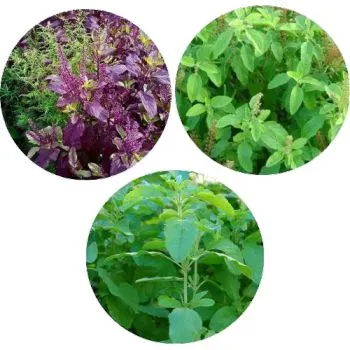
There three main types of tulsi cultivated in India:
| Ram Tulsi |
| These are commonly cultivated and have bright green leaves. Benefits : This Tulsi helps to reduce stress & anxiety and improve mental clarity. |
| Krishna Tulsi |
| These Tulsi are less common and have darker purple leaves. Benefits: It is good for heart and diabetic people and helps to maintain blood sugar and cholesterol levels. |
| Vana Tulsi |
| These Tulsi are called wild plants that are often found in forests and are very common. Benefits: Vana Tulsi helps to clean the air and improve its quality and also contains adaptogenic and cooling properties that can help to reduce stress & anxiety. |
Tulsi Vrindavan : Spiritual and Environmental Benefits
One of the advantages of Tulsi is that it holds spiritual and environmental importance. In Hindu houses, people plant tulsi in the centre of the courtyard because of the following reasons-
Environment Purification

People say that tulsi, in fact, purifies the air by emitting oxygen and, moreover, absorbs the harmful carbon dioxide, which, as result, automatically improves a household’s air quality.
Architectural Role
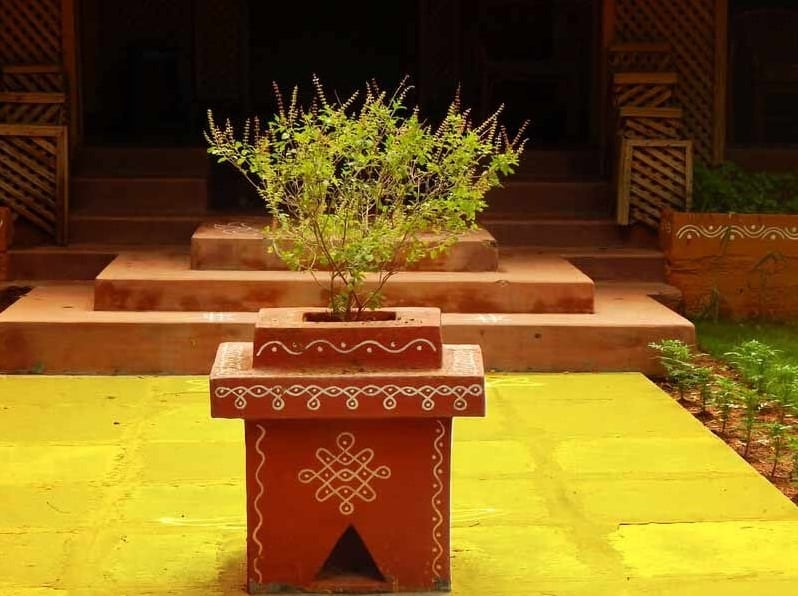
Usually, in Traditional Indian homes, people consider the courtyard or Aangan the heart of the house, and planting the tulsi there can lead to spiritual practices in daily life.
Connection to Nature
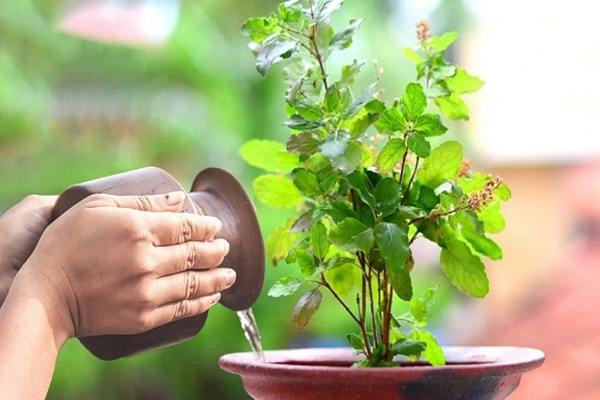
Family members reconnect with nature by watering, worshipping, and also creating a habit of taking care of Tulsi plants or doing some activities of Tulsi plant care as a part of their daily routine.
History and Origin
Mentioned in Ancient Texts

Various ancient Indian texts, such as the Vedas, Charaka Samhita, and Sushruta Samhita, indeed mention Tulsi. Furthermore, these scriptures explain how holy basil possesses immense benefits, along with its medicinal and spiritual power, as well as its value.
Tulsi & Hindu Mythology

People symbolize Tulsi as a woman; moreover, they consider her the earthly manifestation of the Goddess Tulasi, an incarnation of Goddess Lakshmi.
Additionally, she devoutly follows Lord Vishnu/Krishna. Furthermore, many priests recommend that worshippers offer Tulsi leaves in ritualistic worship of Lord Vishnu and his avatars, such as Krishna and Vitoba.
In fact, Hindus use Tulsi leaves in rituals such as Puja, and they believe that, consequently, Tulsi water (Tulsi Jal) purifies the mind and body. Ultimately, devotees consider it an important part of Hindu festivals like Diwali, where, in turn, they use its leaves as offerings to the deities.
Tulsi vs Basil : Key Differences
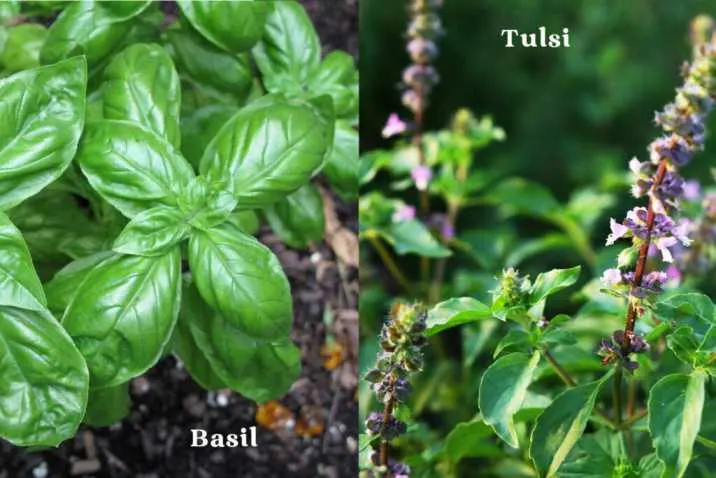
If we talk about the difference of tulsi v/s basil, we should recognize that, firstly, they both share the same starting name, which is Ocimum.
Additionally, both herbs belong to the same family, i.e., Lamiaceae, which includes mint plants and culinary herbs such as rosemary, oregano, lavender, catnip, and others.
| Feature | Tulsi | Basil |
| Region | Indian Sub- continent | Western Regions (e.g. Thailand) |
| Used In | Herbal tea and Ayurvedic Remedies. | Western cuisines |
| Properties | Adaptogen, Detoxifier, Antioxidant. | Culinary Herb |
Tulsi Products with Practical Application
There are so many Tulsi products that are used in making tea,skin and hair care and many more.
Herbal Tea

According to Ayurveda, Tulsi tea is an herbal infusion without any caffeine, full of nutrients and antioxidants.
Tulsi Powder
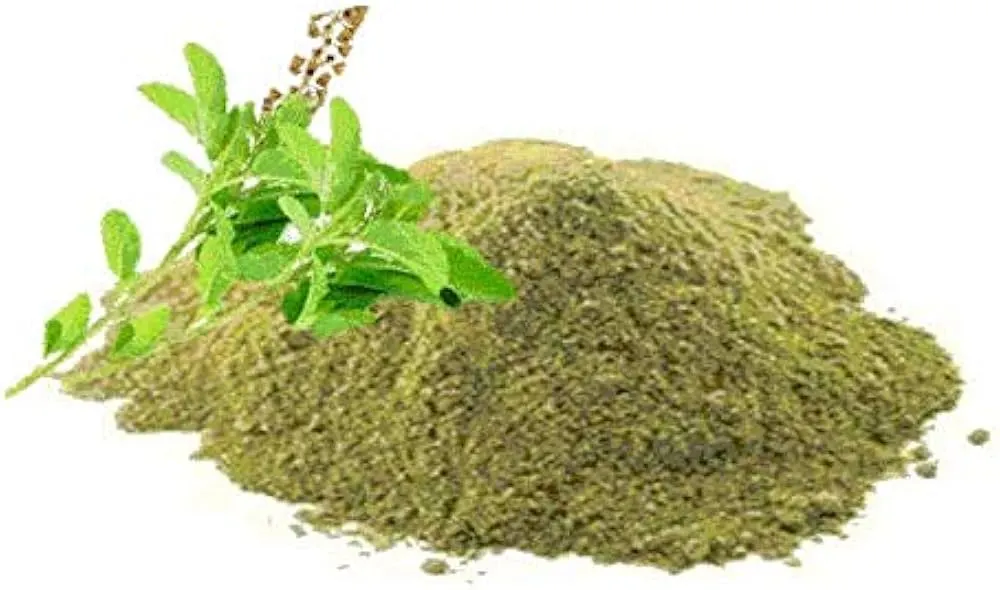
Tulsi leaves are dried up and ground into powder. Then this powder is:
- Used as Face masks ,
- Mixed in smoothies,
- Put in boiling water to help to ease the pain of sore throat.
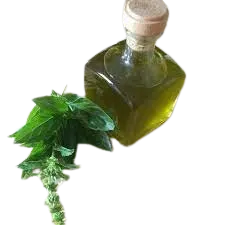
Tulsi Oils
Holy basil oil is extracted from the leaves and then:-
- Used for its antimicrobial and anti-inflammatory properties.
- It is applied to skin infections or other skin issues.
- It is used for Aromatherapy and massages.
- Applied to relieve the joint pains.
- It can also be applied when one is suffering from Headache.
Side Effects of Tulsi
When people take everything in excessive amounts, they can harm their bodies and, consequently, experience side effects. Even though Tulsi offers many benefits and can help with practically every issue a human body may have, we should, therefore, consider certain things before using it.
- Over-consumption Risk: Consuming too much tulsi in any form (food or medicine) can in fact, lead to an overdose of Eugenol, which eventually causes respiratory issues like fast breathing and vomiting blood while coughing.
- Experts say that Tulsi contains eugenol that helps to reduce respiratory issues but taking an excess of this will result in poisoning.
- Male Fertility Concerns: It can hurt male fertility.
- Blood Thinning : Tulsi leads to blood clotting,so individuals on blood thinners should consume it cautiously.
Conclusion
The benefits of the Tulsi plant extend beyond its religious importance.Whether it is taken as tulsi tea,powder,oil or any form,Tulsi has numerous benefits such as boosting immunity,improving mental health,respiratory health,digestion and detoxificationThe benefits of drinking tulsi water and eating it make it essential herb for a healthy lifestyle. Also by incorporating Tulsi into daily life, one can harness the power of nature for a healthier body and mind.
“Tulsi has deep roots in Ayurveda! Learn more in our next blog on Tulsi in Ayurveda!”
